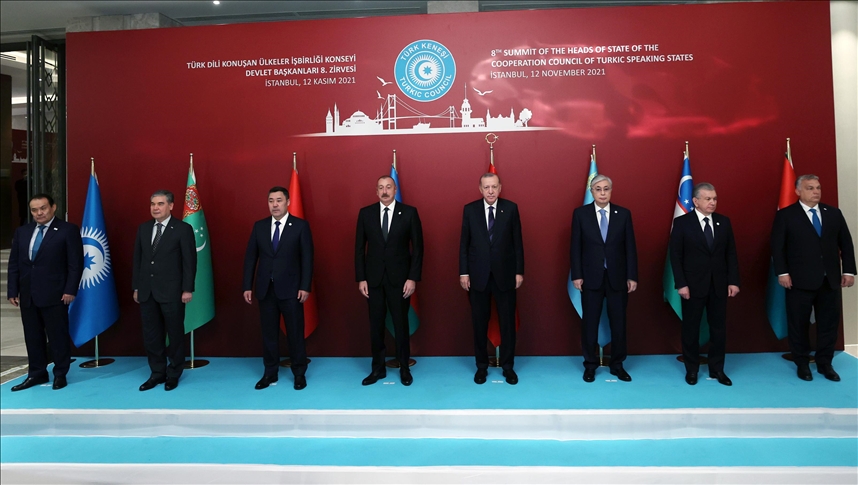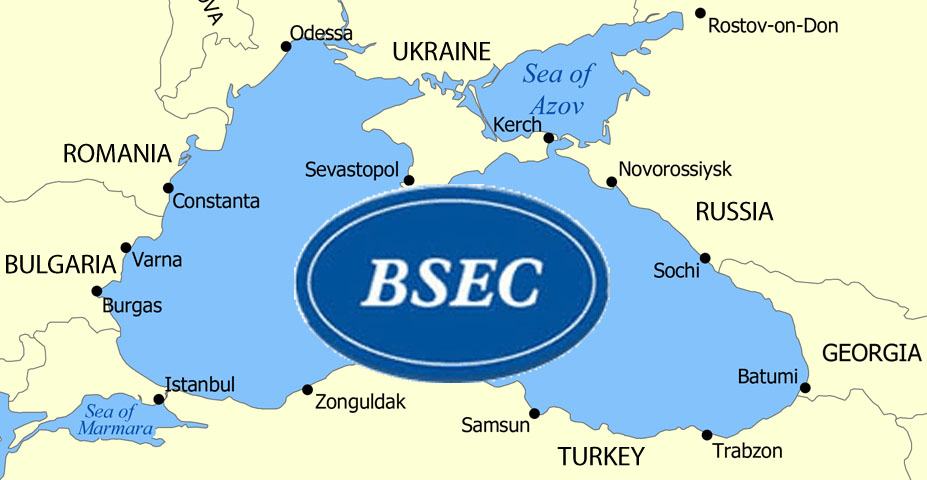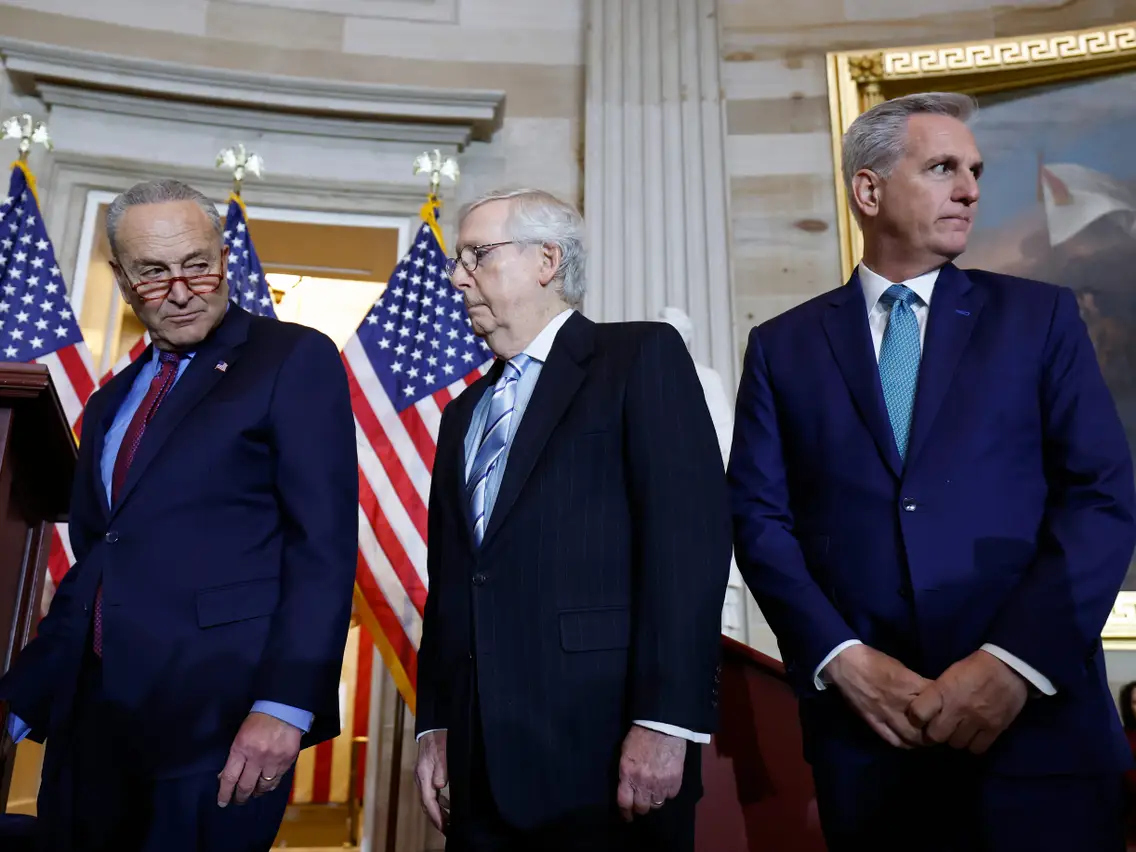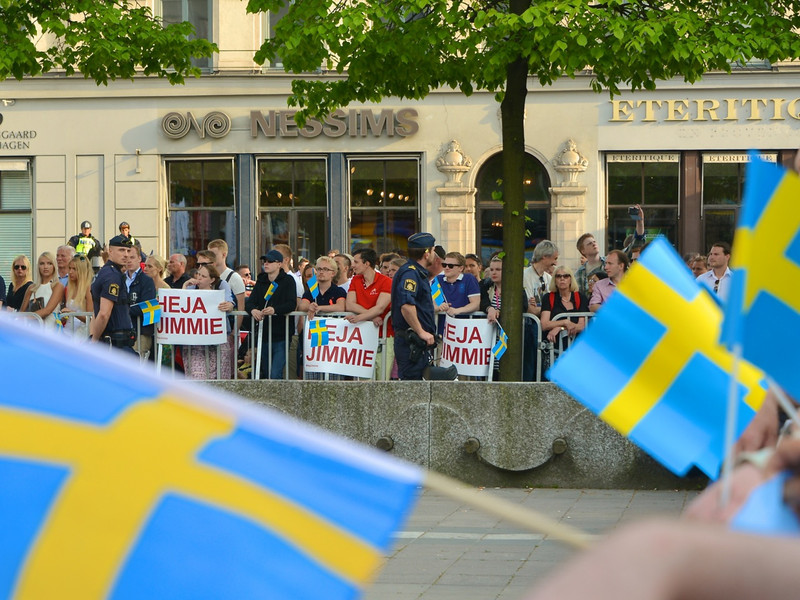
Deniz ÜNVER
Independent Researcher
On October 12, 2021, the 8th Summit of the Organization of Turkic States, which was hosted by President of Turkey Recep Tayyip Erdoğan, was held with the participation of Presidents of Azerbaijan, Kazakhstan, Kyrgyzstan, Uzbekistan, and Turkmenistan, the Prime Minister of Hungary, and the Secretary General of the Turkic Council[1].
The date of the summit coincided with the 30th anniversary of the independence of the Central Asian states[2]. In the summit, whose theme was “Green Technologies and Smart Cities in Digital Age”, the leaders of the Turkic states discussed the significant topics in the global agenda and reached an agreement regarding those decisions concerning the future of the organization[3]. The crucial topics of the agenda were the formation of Turkic Investment Fund and approval of the Turkic World Vision 2040 document. The leaders of the Organization of the Turkic States also discussed issues on crucial political and economic developments in the region while stressing the increasing role and the future of the Organization in addressing those issues in the international arena[4]. It was expressed in the summit that effective collaboration needs to be further reinforced and supported in all possible fields, particularly in increasing trade and investments, transport and logistics, and green and renewable energy[5]. Upon the proposal of the Turkish President, Azerbaijani President received an award due to the historic victory leading to the liberation of Azerbaijan’s territory that had been invaded by Armenia’s forces[6]. The victory contributed significantly to the unification of the Turkic world[7] via the Zengezur Corridor and the opportunity it has created for stabilization and peace of the region. Another point noted in the summit was that the Chairmanship of the Organization passed on from Azerbaijan to Turkey and İstanbul Declaration was adopted by the Heads of the States[8].
Preceding the 8th Summit of the Organization of Turkic States, the meeting of Foreign Ministers took place on November 11, 2021 in İstanbul[9]. In the meeting, it was announced by the Turkish Minister of Foreign Affairs Mevlüt Çavuşoğlu that the Ministers agreed to change the name of “Turkic Council” to the “Organization of Turkic States”.[10] This was affirmed the next day at the 8th Summit. Turkish President Erdoğan made the following statement: “We are changing the name of our Council, which has developed its institutional structure and boosted its prestige in its region and beyond, to the Organization of Turkic States. Obviously, this historic change should not remain limited to rhetoric, it should be put into action as well.”[11]
It was also mentioned by Turkish Minister of Foreign Affairs Çavuşoğlu that the Organization is going through a transformation phase. Regarding this, he stated; “We will strengthen our international power as we consolidate our unity without forgetting our roots”[12]. He added that, the economies of the member countries need improvement. He declared that “In order to connect our economies, we have to improve our cooperation and collaboration in the field of logistics and transportation[13]”. It is expected that the Zengezur Corridor, which became feasible after the Nagorno-Karabakh war of last year, will improve and develop the economic ties between the Turkic states as well as the welfare [14].
The significant event of the 8th Summit was the acceptance of a strategic document titled "'Turkic World 2040 Vision”[15]. This document was accepted with the initiation of the honorary chairman of the Organization, Nursultan Nazarbaev, and according to him, it can be considered as a guide showing future cooperation among Turkic countries in fields of mutual interest[16]. It is to be surmised that, with the 2040 Vision, the Turkic world can have stronger foreign policy and security coordination as well as more economic cooperation, since signing bilateral trade agreements and opening borders for transportation is easier now for the signatory countries.[17]
Another significant event of the summit was the declaration of Turkish President Erdoğan that he wishes to see the Turkish Republic of Northern Cyprus among the members of the Organization of Turkic States[18]. During the summit, President Erdoğan stated, “I trust in your valuable support in easing the isolation and embargo against Turkish Cypriots, who are an inseparable part of the Turkic World.”[19]
The Turkish President called on the leaders of the Turkic states to cooperate more on the fight against terrorism[20]. He added that, “We must act together in the fight against Islamophobia and xenophobia that are the plague of our time[21]”.
The Organization of Turkic Council is gainin a significant place in the Eurasian region as well as in the international arena. For this reason, its own unique and complicated history must be known. It dates back to October 30, 1992, when the leaders of Turkey, Azerbaijan, Kazakhstan, Uzbekistan, Kyrgyzstan, and Turkmenistan gathered in Ankara with the initiative of Turgut Özal, the President of Turkey at that time[22]. After this meeting, the participants announced the establishment of an economic and political unity[23]. After this meeting, it was declared that an agreement on the establishment of International Organization of Turkic Culture was signed in Almaty, on July 12, 1993[24]. In 2009, with the signing of the historic Nakchevan Agreement, the organization was established under the name of Turkic Council to enhance cooperation among Turkic states[25] and it was an intergovernmental group at the time it was established[26]. Due to the common historical, linguistic, and cultural ties, it was expected that the establishment of such an organization would develop social, economic, and cultural relations[27]. Therefore, it can be suggested that the collapse of the Soviet Union and the desire for unification of Turkic people led the organization to be established[28]. With a view for better cooperation and integration, various institutions have been built under the organization such as Organization of Turkic Culture (TURKSOY) in 1993, the Parliamentary Assembly of Turkic Speaking Countries (TURKPA) in 2008, the International Turkic Academy in 2010, the Turkic Business Council in 2011, and finally the Turkic Culture and Heritage Foundation in 2012[29].
All of these indicate that the role of the Organization of Turkic States and implicitly Ankara have gained more clout with the recent political developments and particularly, due to the rise of Asia in international arena. With the rise of Asia, the geography occupied by Turkic countries has turned out to be a more attractive place for trade routes. The recent initiatives such as China’s Belt and Road Initiative are the clear indicators of this. With the rise of China and the region, the Turkic world has become crucial in the world politics and trade due to their strategic location. The mobility in the Turkic world and the increasing prestige and effectiveness of the Organization of the Turkic States justifies this argument. It can be claimed that the Organization and its members will integrate more in the fields of mutual interest in the future. Besides, it can be stated that the Turkish world is on rise and in the future, the Turkic speaking countries will have a greater role in the world politics. This will strengthen Ankara’s role as well.
*Photograph: https://www.aa.com.tr/en/analysis/analysis-from-turkic-speaking-countries-to-turkish-states/2422657
[1] “Eighth Summit of the Organization of Turkic States was held in Istanbul”, turkkon.org, November 12, 2021,https://www.turkkon.org/en/haberler/eighth-summit-of-the-organization-of-turkic-states-was-held-in-istanbul_2394
[2] “Eighth Summit of the Organization of Turkic States was held in Istanbul”, turkkon.org.
[3] Ibid.
[4] Ibid.
[5] Ibid.
[6] Ibid.
[7] Ibid.
[8] Ibid.
[9] “Turkic Council revamps image, aims to boost ties through transformation”, Daily Sabah.
[10] Ibid.
[11] “Turkic Council reforms into Organization of Turkic States”, TRT World, November 13, 2021,https://www.trtworld.com/turkey/turkic-council-reforms-into-organization-of-turkic-states-51608
[12] “Turkic Council revamps image, aims to boost ties through transformation”, Daily Sabah.
[13] Büşra Nur Çakmak and Ruslan Rehimov, “Turkic grouping to change its name to Organization of Turkic States: Turkish foreign minister”, Anadolu Agency, November 11, 2021,https://www.aa.com.tr/en/turkey/turkic-grouping-to-change-its-name-to-organization-of-turkic-states-turkish-foreign-minister/2418130
[14] Ibid.
[15] “Turkic Council reforms into Organization of Turkic States”, TRT World.
[16] Ibid.
[17] “Turkic Council revamps image, aims to boost ties through transformation”, Daily Sabah.
[18] “Turkey urges Turkish Cypriot membership in Turkic Council”, Hürriyet Daily News, November 12, 2021,https://www.hurriyetdailynews.com/turkish-president-inaugurates-turkic-council-general-secretariat-building-169326
[19]“Turkey urges Turkish Cypriot membership in Turkic Council”, Hürriyet Daily News.
[20] Ibid.
[21] Ibid.
[22] “Cooperation Council of Turkic Speaking States Marks Ten Years Since First Summit in Almaty”, Astana Times, November 1, 2021,https://astanatimes.com/2021/11/cooperation-council-of-turkic-speaking-states-marks-ten-years-since-first-summit-in-almaty/
[23] “Cooperation Council of Turkic Speaking States Marks Ten Years Since First Summit in Almaty”, Astana Times.
[24] Ibid.
[25] “Turkic Council reforms into Organization of Turkic States”, TRT World.
[26] Ibid.
[27] Ufuk Ulutaş and Oktay F. Tanrısever, “The Turkic Council on the 10th Anniversary of the Nakhchivan Agreement: A View from Turkey”, SAM, 2019,https://www.turkkon.org/assets/pdf/haberler/special-publication-turkic-council-10th-anniversary-of-the-nakhchivan-agreement-1909-38.pdf
[28] “Cooperation Council of Turkic Speaking States Marks Ten Years Since First Summit in Almaty”, Astana Times.
[29] “Turkic Council revamps image, aims to boost ties through transformation”, Daily Sabah.
© 2009-2025 Avrasya İncelemeleri Merkezi (AVİM) Tüm Hakları Saklıdır
Henüz Yorum Yapılmamış.
-
 ABD VE RUSYA ARASINDAKİ İNSANSIZ HAVA ARACI ANLAŞMAZLIĞI BAĞLAMINDA KARADENİZ EKONOMİK İŞ BİRLİĞİ VE KARADENİZ’DE GÜVENLİK - 27.03.2032
ABD VE RUSYA ARASINDAKİ İNSANSIZ HAVA ARACI ANLAŞMAZLIĞI BAĞLAMINDA KARADENİZ EKONOMİK İŞ BİRLİĞİ VE KARADENİZ’DE GÜVENLİK - 27.03.2032
Deniz ÜNVER 28.03.2023 -
 US DEBT CEILING - 14.06.2023
US DEBT CEILING - 14.06.2023
Deniz ÜNVER 14.06.2023 -
 ÜÇ DENİZ GİRİŞİMİ VE NATO GENİŞLEMESİ - 17.12.2021
ÜÇ DENİZ GİRİŞİMİ VE NATO GENİŞLEMESİ - 17.12.2021
Deniz ÜNVER 14.01.2022 -
 THREE SEAS INITIATIVE (3SI): A WESTERN ATTEMPT AT GREAT POWER COMPETITION - 03.03.2023
THREE SEAS INITIATIVE (3SI): A WESTERN ATTEMPT AT GREAT POWER COMPETITION - 03.03.2023
Deniz ÜNVER 03.03.2023 -
 HAS THE RUSSO-UKRAINIAN WAR TRIGGERED A BRETTON WOODS MOMENT? - 28.04.2022
HAS THE RUSSO-UKRAINIAN WAR TRIGGERED A BRETTON WOODS MOMENT? - 28.04.2022
Deniz ÜNVER 28.04.2022
-
ABD'NİN YENİ 11 EYLÜL'Ü
Mehmet KANCI 19.09.2012 -
TACİKİSTAN VE HİZB-UT TAHRİR FAALİYETLERİ-Gökçen EKİCİ
- 06.02.2011 -
 SWEDISH EU PRESIDENCY MAKES THEIR FAR-RIGHT A PAN-EUROPEAN THREAT - EU OBSERVER - 13.01.2023
SWEDISH EU PRESIDENCY MAKES THEIR FAR-RIGHT A PAN-EUROPEAN THREAT - EU OBSERVER - 13.01.2023
Malin BJÖRK 16.01.2023 -
 PLEASE LEAVE HISTORY TO HISTORIANS - ARTICLE BY MAXIME GAUIN, DAILY SABAH, 21 MAY 2016
PLEASE LEAVE HISTORY TO HISTORIANS - ARTICLE BY MAXIME GAUIN, DAILY SABAH, 21 MAY 2016
Maxime GAUIN 25.05.2016 -
KIRIM TÜRKLERİ VE RUSYA
Prof. Dr. Alaeddin YALÇINKAYA 16.03.2014


